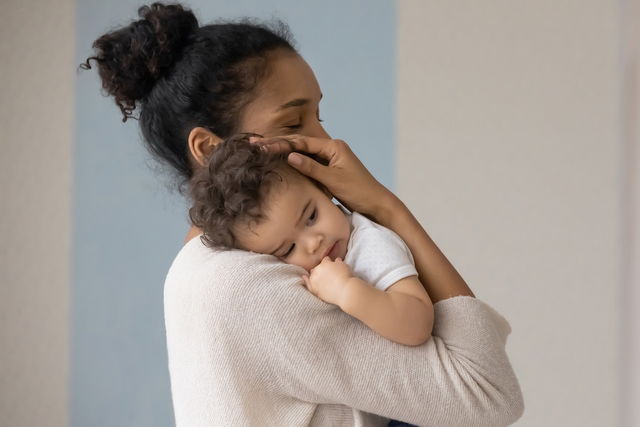One way to treat a baby cough is to keep the baby sitting up or standing to facilitate breathing. Another way to reduce coughing is to offer small quantities of water to the baby (if age appropriate), to decrease throat irritation.
If the baby present with.a fever, difficulty breathing or additionally has vomiting, the baby should be assessed by a doctor. Medications like antibiotics and antihistamines may be recommended.
Coughing is a very common symptom in babies, and occurs as a natural defense mechanism to expel accumulated food or secretions. Coughs can appear with colds, bronchitis, asthma or a congestion.

Home remedies
Some home remedies that can help relieve coughing in babies include:
- Offer small amounts of water to the baby throughout the day, if the baby is over 6 months of age, or allow the baby to breastfeed on demand or offer room-temperature formula. This can help to reduce throat irritation. Fluids should only be offered when the coughing has ceased to prevent choking.
- Rinse the baby’s nasal passages with saline, when their nose is stuffy. This can help to open the nasal airway and relieve coughing. Learn how to perform a nasal irrigation at home.
- Perform a nebulizer with saline, to clean and hydrate the airways and decrease irritation to prevent coughing. Another option to give the baby a warm bath in a closed bathroom, so that the baby can inhale the vapor.
In addition, if the baby is coughing throughout the night, you can place a pillow or folded towels beneath the mattress to elevate the head of the bed. This can help to keep the airways open and decrease the coughing reflex.
If the coughing is caused by a cold, orange juice with cherries, or onion peel tea can be excellent home remedies. These should only be offered to babies over 6 months.
Pharmacy medication
Medications are prescribed by the pediatrician when coughing is caused by more complicated illnesses, like pneumonia or asthma.
The pediatrician may be able to recommend over-the-counter medications, like allergy medications, decongestants or expectorants. Duration of treatment and dosing will vary with age, the baby’s health status and the cause of the cough.
When to see the doctor
The baby should be assessed if they are under 6 months of age, if they have a history of a cardiac or lung problem, or have any of the following symptoms:
- Coughing for over 5 days T
- Dry cough mainly at night
- Fever over 38ºC (or 100.4ºF)
- Increased breathing rate
- Difficulty breathing, which can be noted with blue skin or lips
- Noise or wheezing with breathing
- Lots of phlegm or phlegm with blood
- Coughing with vomiting T
It is important for parents or caregivers to report all symptoms to the pediatrician and to describe when they started and what has been done to relieve the cough.
Main causes
The main causes of a dry cough in babies are:
- Flu or cold
- Intense smells, such as cigarette smoke, fresh paint or insecticide
- Asthma
- Reflux
- Laryngitis
- Rhinitis
- Pneumonia
- Whooping cough
In addition to infections, another possible cause of dry cough sin babies is choking, which can be caused by the presence of an object or food in the child's throat.
